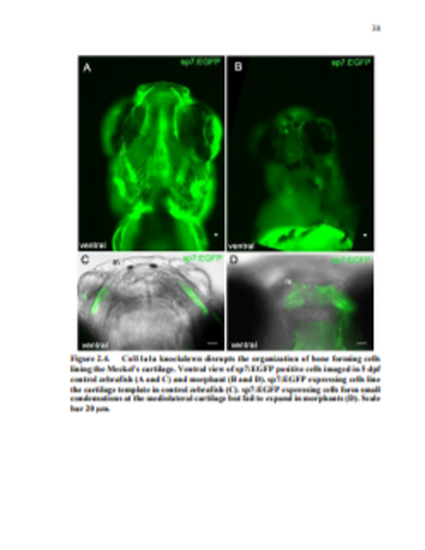
It is currently a major scientific and medical goal to identify and characterize genetic defects and their impact in health and disease. For example, mutations in genes that encode collagen alpha chains can cause skeletal dysplasia and lead to premature degenerative joint disease. Collagen is the main structural protein in the ECM of connective tissues such as the cartilage, joints, ligaments and tendons. Therefore, the goal of this research is to define the impact of the alpha one chain of collagen type XI chain, encoded by the COL11A1 gene in humans, on chondrocyte behavior during development of the cartilage. We hypothesize that altered expression of COL11A1 dysregulates chondrocyte behavior during cartilage development by altering β-catenin dependent signaling pathways. To test this hypothesis, we inhibited the expression of the COL11A1 homolog col11a1a in transgenic zebrafish expressing green fluorescence protein in neural crest derived cells and osteoblast. Then, the col11a1a deficient zebrafish were imaged by confocal microscopy to analyze the organization of cells contributing to craniofacial development. Inhibiting col11a1a expression reduced the size and shape of the developing Meckel’s cartilage in zebrafish. These changes occurred because the cells failed to form the hallmark columns that normally promote longitudinal growth. In addition, premature and ectopic mineralization was found to occur in the cartilage tissue of the Meckel’s cartilage. Additional investigation using the well-established embryonic mouse cell line ATDC5 led to the identification of changes in post translational modification of proteins which regulate cell behavior. Specifically, the AKT/GSK3β/β-catenin proteins were modified to increase the activity of the transcription factor TCF/LEF. This activation was coupled to 1) changes in gene expression, 2) decreased cartilage growth, and 3) increased mineralization. In conclusion, the results confirm that loss of COL11A1 homolog expression in zebrafish (col11a1a) and mouse (Col11a1) cells leads to severe chondrodysplasia that affects cells behavior and tissue shape. Treatment enhancing COL11A1 protein production in humans may be useful in inhibiting excessive mineralization. On the other hand, inhibition of COL11A1 protein production could be useful for tissue engineers and researchers developing treatments to accelerate the mineralization of cartilage during fracture healing in patients.
Available at: http://works.bepress.com/jonathon-reeck/8/
